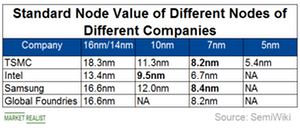This Technology Gives TSMC the Advantage over Samsung and Intel
Taiwan Semiconductor Manufacturing Company (TSM) is ramping up the production of its 7 nm node ahead of Samsung (SSNLF).
July 26 2018, Updated 10:30 a.m. ET

What TSMC’s technology advantage over Intel means for AMD
Taiwan Semiconductor Manufacturing Company (TSM) is ramping up the production of its 7 nm (nanometer) node ahead of Samsung (SSNLF). On the other hand, Intel (INTC) is still struggling with its 10 nm node and has already delayed it by two years. It now plans to start volume production on the 10 nm node in 2019.
TSMC claims that its 7 nm node is similar to Intel’s 10 nm node. However, TSMC is starting volume production in 2018, which puts it ahead of Intel in terms of manufacturing technology for the first time.
Advanced Micro Devices (AMD), Intel’s rival in the PC and server CPU (central processing unit) market, is leveraging TSMC’s technology advantage to get ahead of Intel in terms of manufacturing technology. By the end of 2018, AMD will manufacture its AI server CPUs and GPUs (graphics processing unit) on TSMC’s 7 nm node.
TSMC versus Samsung
According to an article in fudzilla, TSMC is ahead of Samsung in the 7 nm race, as it’s using existing lithography techniques, whereas the latter will be the first to use the EUV (extreme ultraviolet) lithography technique, which has been in development for around 30 years and is an expensive technology. TSMC plans to use EUV in its 7 nm plus node.
TSMC’s upcoming manufacturing nodes
On the company’s second-quarter earnings call, its CEO, C. C. Wei, stated that it had secured EUV tools and expects to use this technology for the first time in its 7 nm plus node. It expects to begin volume production of the 7 nm plus node in the second quarter of 2019. This node is expected to deliver 15%–20% better density and over 10% more power efficiency than the 7 nm node.
TSMC plans to start risk production on the 5 nm node in the first half of 2019 and volume production in the first half of 2020. Samsung also plans to start working on the 5 nm node in 2019.
Advanced nodes are impacting TSMC’s margins. We’ll look into this next.
